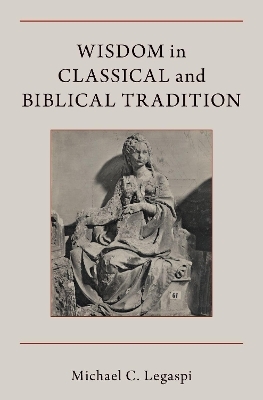
Wisdom in Classical and Biblical Tradition
Seiten
2018
Oxford University Press Inc (Verlag)
978-0-19-088512-0 (ISBN)
Oxford University Press Inc (Verlag)
978-0-19-088512-0 (ISBN)
Wisdom in Classical and Biblical Tradition begins with the recognition that modern culture emerged from a synthesis of the legacies of ancient Greek civilization and the theological perspectives of Jewish and Christian scriptures. Part of what made this synthesis possible was a shared outlook: a common aspiration toward wholeness of understanding that refused to separate knowledge from goodness, virtue from happiness, cosmos from polis, and divine authority from human responsibility. This wholeness of understanding, or wisdom, features prominently in both classical and biblical literatures as an ultimate good.
Wisdom in Classical and Biblical Tradition has two central aims. The first is to explain in formal terms what wisdom is. Though wisdom involves matters of practical judgment affecting the life of the individual and the social sphere, it has also been identified with an understanding of the world and of the ultimate realities that give meaning to human thought and action. Michael Legaspi explains how, in its traditional form, wisdom was understood to govern intellectual, social, and ethical endeavors. Legaspi's second aim is to analyze figures and texts that have yielded and shaped the traditional understanding of wisdom. This book examines accounts of wisdom from foundational texts that range from the period of Homer to the destruction of the Second Temple, and explains why the search for wisdom remains an important but problematic endeavor today.
Wisdom in Classical and Biblical Tradition has two central aims. The first is to explain in formal terms what wisdom is. Though wisdom involves matters of practical judgment affecting the life of the individual and the social sphere, it has also been identified with an understanding of the world and of the ultimate realities that give meaning to human thought and action. Michael Legaspi explains how, in its traditional form, wisdom was understood to govern intellectual, social, and ethical endeavors. Legaspi's second aim is to analyze figures and texts that have yielded and shaped the traditional understanding of wisdom. This book examines accounts of wisdom from foundational texts that range from the period of Homer to the destruction of the Second Temple, and explains why the search for wisdom remains an important but problematic endeavor today.
William Legaspi is Associate Professor of Classics and Ancient Mediterranean Studies at Penn State University, and the author of The Death of Scripture and the Rise of Biblical Studies.
Introduction
Chapter 1. Homer and the Wisdom of the Hero
Chapter 2. Wisdom and Knowledge in the Hebrew Bible
Chapter 3. Job the True Sage
Chapter 4. Piety and Wisdom in Socrates
Chapter 5. A Nation of Philosophers
Chapter 6. The School of Solomon
Chapter 7. An End to Wisdom
Conclusion
Bibliography
| Erscheinungsdatum | 20.09.2018 |
|---|---|
| Verlagsort | New York |
| Sprache | englisch |
| Maße | 236 x 160 mm |
| Gewicht | 567 g |
| Themenwelt | Literatur ► Klassiker / Moderne Klassiker |
| Religion / Theologie ► Christentum ► Kirchengeschichte | |
| ISBN-10 | 0-19-088512-2 / 0190885122 |
| ISBN-13 | 978-0-19-088512-0 / 9780190885120 |
| Zustand | Neuware |
| Haben Sie eine Frage zum Produkt? |
Mehr entdecken
aus dem Bereich
aus dem Bereich
von Athanasius bis Gregor dem Großen
Buch | Softcover (2024)
C.H.Beck (Verlag)
12,00 €


